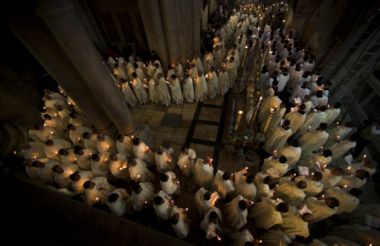Religious conversion: Homeland's Brody hasn't helped any of us

Whilst it may not be a dirty word, conversion enjoys a mixed reception. Used normally to describe the switch from one currency or utility provider to another, its religious connotations are generally negative.
Just think of US Marine Nicholas Brody (played by Damian Lewis) in Channel Four's Homeland and the portrayal of conversion as the expression of fanaticism. An American serviceman becomes a Muslim in captivity and returns home radicalised.
Whilst religious faith is not a taboo subject in secular Britain, many converts feel misunderstood by mainstream culture and isolated from their own communities. That's the dark side of this experience of profound change. But of course there's another story. As a global faith, Christianity has a love affair with conversion. It promotes it, advocates it and expects most of its adherents to have a change story.
So going to an event called 'Welcoming the Convert in Wales,' made me feel excited and uneasy in equal measure. Would I be in the company of the inflamed and angry? Would there be more heat than light? Would I be in the company of the really weird people I normally try and avoid?
About 20 people came and it was hosted by Jim Stewart of Evangelical Alliance Wales. After short introduction where we learnt about the freedom to change religion as defiend by the universal Declaration fo Human Rihts adn the European Convention on Human Rights, two speakers were introduced.
The first speaker was Omer. He grew up in Wales where his grandmother was his greatest religious influence. Growing up initially within a Methodist and then Baptist Church, Omer's religious leanings were Christian. His was an unlikely conversion. After mocking a few Muslims at his school, he was given a leaflet and challenged to learn more about the religion. This resulted in a visit to a mosque where he was warmly received and shown around. His questions were answered, particularly in relation to Jesus. He felt he'd come home and became a Muslim.
He told a story which illustrated the power of his new found faith. Just before his conversion he visited someone in hospital who constantly had visitors at their bed. After asking a few questions he was told that none of these people were his family but belonged to the same mosque. Their presence was a sign of their compassion and solidarity for one of their own.
The next speaker was a late addition to the programme. Sahid, an Iranian convert to Christianity from Islam had sent his apologies and instead we listened to Katie talking about her research. She had recently spoken to a large number of Muslims who had converted to Christianity. Here were some of her main conclusions:
• Iranians are more likely to become Christians than any other group she interviewed.
• Many converts experienced verbal abuse from the faith communities they left.
• Some new converts felt that churches put them on a pedestal and had unrealistic expectations of them.
• Many found British church life too individualistic and wanted to feel they were part of a community.
Curiously, the last point generated a cross-faith discussion with similar experiences being aired. A few of the Muslims said that converts to Islam are often given a hug and a prayer and then left to their own devices. Some of the Christians agreed, sharing that converts from other cultures want to feel they belong to a family and struggle with an individualism they have not come across before.
These sentiments made me reflect on the light and dark sides of conversion. At its best an individual is so gripped by the truth of the gospel they are prepared to leave all they have been in pursuit of a new king and His community. At its worst it can seem no different to my right to choose what I want to believe with no accountability and no context. As someone said to me recently about church: "I want friends, not programmes."
I walked back into the cold night air, feeling I'd been offered a glimpse into a world too often concealed by fear and prejudice, I realised that all too often I've been swayed by the screaming tabloid banner headlines without listening to the quiet, impressive lives of people who've had the courage to change.











